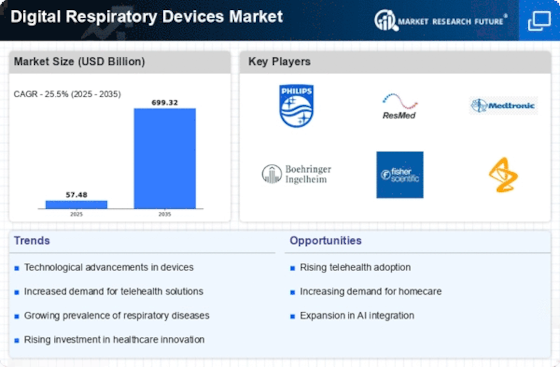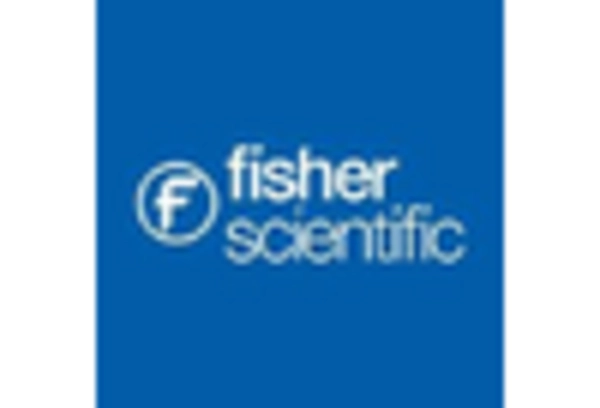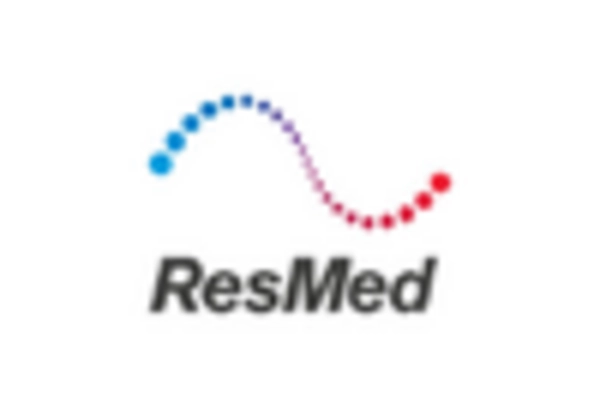Market Share
Digital Respiratory Devices Market Share Analysis
The landscape of respiratory care is undergoing a profound transformation, propelled by the remarkable ascent of smart inhalers driven by cutting-edge technological advancements. The widespread adoption of technologically advanced products, fostering heightened interaction between users and devices, has ignited a global surge in the usage of smart inhalers. These innovative devices not only empower patients with a deeper understanding of their disease conditions and dosage requirements but also provide a user-friendly interface for self-monitoring. As companies such as Gecko and Cohero Health introduce home-based services, the market is experiencing substantial growth, fueled by the irresistible appeal of fast results, easy handling, and improved accuracy offered by these digital solutions.
Central to the escalating adoption of smart inhalers worldwide is the relentless march of technological progress. The advent of sophisticated products facilitating enhanced interaction between users and devices signifies a seismic shift in respiratory care. Smart inhalers stand as a testament to this progress, offering a dynamic and personalized approach to managing respiratory conditions. The infusion of technology into inhaler devices has created an environment where patients can actively engage with their treatment plans, leading to a profound understanding of their health.
A defining feature of smart inhalers is their ability to bridge the gap between patients and their treatment. By providing a platform for users to interact with their devices, these inhalers empower patients to comprehend their disease conditions and dosage requirements better. The real-time feedback and insights offered by smart inhalers create a symbiotic relationship between patients and their respiratory health, fostering a sense of ownership and responsibility in managing their conditions.
Moreover, the introduction of home-based services by companies like Gecko and Cohero Health has emerged as a driving force behind the escalating market growth of smart inhalers. These services bring the benefits of respiratory care directly into the homes of patients, obviating the need for frequent hospital or clinic visits. This shift towards home-based solutions aligns with the broader trend of telehealth services, offering convenience and accessibility to patients while simultaneously propelling the adoption of smart inhalers.
The allure of home healthcare or telehealth services transcends mere convenience; it is anchored in the promise of fast results, easy handling, and improved accuracy. Smart inhalers, as integral components of these services, embody these qualities, contributing to their increasing use. Patients appreciate the immediacy of results, the simplicity of handling smart inhalers, and the enhanced accuracy in tracking their respiratory health. These factors collectively create a compelling proposition for individuals seeking efficient and patient-centric respiratory care solutions.
The impact of smart inhalers extends beyond the realm of patient experience; it permeates the broader landscape of healthcare delivery. The real-time data generated by smart inhalers becomes a valuable resource for healthcare providers, offering a comprehensive and accurate snapshot of patients' adherence to prescribed treatment plans. This data-driven approach facilitates more informed decision-making by healthcare professionals, enabling timely interventions and personalized care for patients.
The growth of smart inhalers signals a paradigm shift in healthcare—one that leverages technology to empower patients and streamline healthcare delivery. The seamless integration of smart inhalers into the daily lives of individuals reflects a commitment to enhancing patient outcomes and reducing the burden on traditional healthcare systems. The convergence of technology, home-based services, and the intrinsic benefits of smart inhalers is reshaping the landscape of respiratory care, making it more accessible, user-friendly, and effective.
In conclusion, the increasing usage and market growth of smart inhalers worldwide are intricately linked to the relentless march of technological advancements. As these devices foster greater interaction between users and their treatment plans, patients gain a profound understanding of their respiratory health. The introduction of home-based services by pioneering companies amplifies the appeal of smart inhalers, offering convenience, fast results, easy handling, and improved accuracy. As smart inhalers continue to define the future of respiratory care, they stand as exemplars of how technology can revolutionize patient engagement, healthcare delivery, and the overall experience of managing chronic respiratory conditions.


















Leave a Comment